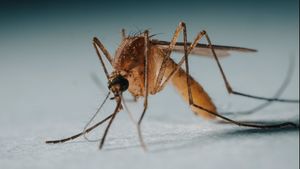JAKARTA - Researcher from Gadjah Mada University (UGM) Professor Adi Utarini said that the innovation of marinebachia mosquitoes is effective in suppressing the replication of the dengue virus in the Aedes aegypti mosquito when its population reaches 60 percent in one area.
"When they reach 60 percent, they will reproduce naturally," said Researcher and Professor of the Faculty of Medicine, Public Health and UGM Nursing Prof. Adi Utarini at the DPR Commission IX Working Meeting as reported by ANTARA, Tuesday, November 28.
The method of releasing the Aedes aegypti-Wolbachia mosquito is carried out in stages using a bucket which is filled with Aedes aegypti mosquito eggs.
Each bucket is placed in each house about 75 meters from one house to another. Then, every two weeks the mosquito eggs in the bucket are replaced with water.
"Thus, for six months the Aedes Aegypti mosquito with Wolbachia will spread to the community," said Uut, as he is usually called.
At the same time, researchers spread 250 mosquito traps in the form of buckets to suck up insects.
"So throughout the city of Yogyakarta we place around 250 traps that we take each week and some are counted one by one, what insects are caught there. Then how many Aedes aegypti are there, this is calculated in this study," he said.
When the population of bisabachia mosquitoes has reached a population of 60 percent, said Uut, these mosquitoes will reproduce naturally.
There are three Wolbachia transmissions in the Aedes aegypti mosquito. First, it occurs when a male mosquito with Wolbachia mates with a female mosquito with Wolbachia so that egg suppression produces aferobachia mosquito.
SEE ALSO:
Second, male mosquitoes do not interact with Wolbachia women with Wolbachia so that egg hatching produces funchastic mosquitoes.
Third, occurs when a male mosquito with a Wolbachia mates with an unWolbachian female so that the egg will not hatch.
Wolbachia is considered capable of stemming the transmission of the dengue virus because it has the ability to compete in food between viruses and bacteria in mosquito cells, with at least food that can support the virus, the dengue virus cannot reproduce.
"When it reaches 60 percent, we pull the bucket and let's stop it," he said.
One of the advantages of theappropriation mosquito when the release is stopped, said Uut, the mosquito breeds naturally with mosquitoes in nature and continues to replicate in nature.
The English, Chinese, Japanese, Arabic, and French versions are automatically generated by the AI. So there may still be inaccuracies in translating, please always see Indonesian as our main language. (system supported by DigitalSiber.id)


















